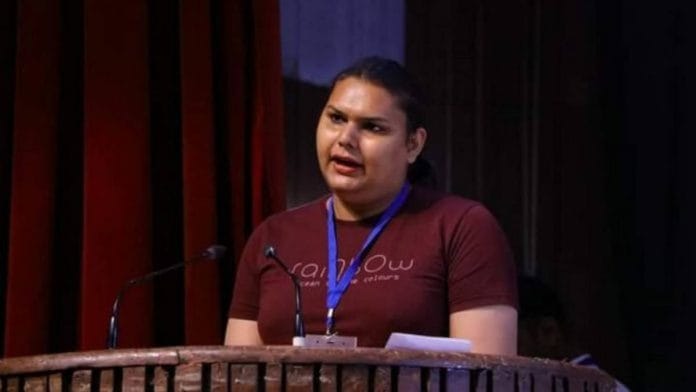New Delhi: After years of facing rejection and prejudice for being a transgender, Jane Kaushik, a trained teacher, finally found justice in the Supreme Court, which held both private schools and state authorities accountable for failing to protect her rights.
The court on 17 October delivered a landmark judgment addressing systemic discrimination against transgender persons in employment. The two-judge bench of Justices J.B. Pardiwala and R. Mahadevan criticised both central and state governments for failing to implement the Transgender Persons (Protection of Rights) Act, 2019, and the 2020 Rules, despite these laws being in force for several years.
It noted that the absence of functional grievance redressal mechanisms, welfare boards, and complaint officers had rendered legal protections for transgender individuals largely symbolic.
At the heart of the case is Jane Kaushik who faced discrimination in two private schools solely because of her gender identity. Her perseverance for justice culminated in the Supreme Court awarding her a total compensation of Rs 2 lakh: Rs 50,000 each from the Centre, the states of Uttar Pradesh and Gujarat, and Rs 50,000 from a private school in Gujarat.
Speaking exclusively to ThePrint, Jane recounted her first experience of discrimination at a school in Uttar Pradesh.
“One of the students discovered my gender identity, and the principal also found out. Immediately, I was terminated, not allowed to take classes that day, and asked to vacate the hostel even though there was no train available to Delhi. I had to take a late-night bus, traveling alone, which was terrifying,” she said.
Despite being from Delhi and holding two Master’s degrees, one in political science and another in English, along with a Bachelor of Education degree, Jane said she faced repeated rejections while looking for a teaching job.
“When I mentioned my gender identity while applying to schools in Delhi, there was silence. Some HR persons even told me that principals were not interested in entertaining my CV once they got to know I am a transgender,” she added.
Jane’s experience in Gujarat in 2023 further highlighted deep-seated bias.
She had been selected for a teaching position but was refused employment once the school became aware of her transgender identity. “They literally scolded me over the phone, asking whether I would negatively influence children. Instead of giving me a job, they suggested I should work in a big city area,” she told ThePrint.
The recurrent bias left Jane traumatised, affecting her mental health. She continues to seek psychiatric help for depression and anxiety resulting from years of discrimination, she said.
Also Read: Fixing gender insensitivity in HCs needs more than a SC handbook. Let’s begin with judges
Institutional failure
Before approaching the Supreme Court, Jane had sought help from key rights institutions, including the National Commission for Women, the National Human Rights Commission and the National Council for Transgender Persons. She said their committees often overlooked her testimony and were influenced by the schools.
“A committee set up by the National Commission for Women didn’t even ask me about the discrimination I faced. They relied on statements from the school instead,” she asserted.
Even the police failed to offer meaningful support. “I could have called the police when I was terminated, but as a transgender woman, I feared insensitivity or abuse. It was only through guidance from the Delhi Commission for Women that my complaint was registered (against the school) in Lakhimpur Kheri, UP,” she said.
While the Supreme Court’s order of Rs 2 lakh compensation is a recognition of her ordeal, Jane said the amount does not fully reflect the financial and emotional losses she suffered.
“I stayed at home for six-seven months with a salary of Rs 45,000 per month. This amount does not compensate for my mental trauma and the impact on my career,” she told ThePrint.
Jane also highlighted a broader issue while urging for systemic change.
“Even with NALSA 2014 (SC judgement recognising transgender people as ‘third gender’), Transgender Persons Act (2019), and the 2020 Rules, implementation is lacking. Without political and bureaucratic will, such discrimination continues. Transgender persons are often treated as second-class citizens,” she said.
“It’s not just about money. It’s about visibility, dignity, and representation in schools, public offices and universities. Until the Supreme Court directions and laws are fully implemented, nothing will change.”
(Edited by Nida Fatima Siddiqui)
Also Read: How Indian schools are failing trans & non-binary teachers — ‘accepted only on the surface’







So this person is very competent yet this person doesn’t get a job because they are “trans” yet others who are absolutely not qualified get jobs as a teacher which is why we see teachers in govt school sleeping in their classes.
Meritocracy shouldn’t care about what your identity is. Seriously fire everyone who is incompetent and is only getting a job because of reservation. Hire this person.